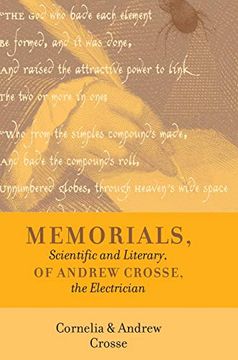Compartir
Memorials, Scientific and Literary, of Andrew Crosse, the Electrician (en Inglés)
Andrew Crosse; Cornelia Crosse (Autor)
·
Timaios Press
· Tapa Dura
Memorials, Scientific and Literary, of Andrew Crosse, the Electrician (en Inglés) - Andrew Crosse; Cornelia Crosse
Elige la lista en la que quieres agregar tu producto o crea una nueva lista
✓ Producto agregado correctamente a la lista de deseos.
Ir a Mis ListasSe enviará desde nuestra bodega entre el
Lunes 13 de Mayo y el
Martes 14 de Mayo.
Lo recibirás en cualquier lugar de Estados Unidos entre 1 y 3 días hábiles luego del envío.
Reseña del libro "Memorials, Scientific and Literary, of Andrew Crosse, the Electrician (en Inglés)"
Today, the English scientist and poet Andrew Crosse (1784-1855) is almost exclusively remembered for his mysterious “Acarus electricus,” a form of mites that seemed to have been created during one of his electrical experiments. But this is unfair.Among his friends were the mathematician Lady Ada Lovelace and prominent scientists such as Sir Humphry Davy and Michael Faraday, but also romantic poets such as Robert Southey and Walter Savage Landor. These and many other celebrities from the first half of the 19th century occurs in this colorful and vivid memorial, written and published by his widow Cornelia Crosse in 1857. Here is depicted not only the life and work of the eccentric and likeable Andrew Crosse; it is also an anthology with examples of his literary output.A typical amateur scientist of the upper classes, Andrew Crosse experimented for his own enjoyment and not for glory. The same applies to his writing; Crosse’s poems circulated among friends, but was only occasionally published during his lifetime. In the poems, prose and letters you see his obsession with the riddle of life and death.All this should be seen in a romantic light. During this era, natural philosophers wanted to form a synthesis of science with aesthetics, imagination and breakneck speculations -- Romantic science was a concept. Researchers and laymen alike was fascinated by electricity, which was presumed to be the key to the mystery of matter and life. Explaining all mysteries of the Universe was within the boundaries of opportunity, and a gifted philosopher could anticipate the answers with his imagination and intuition. Did Crosse really see the electric mites be born in his laboratory 1837, or was this also a phantasy?Robert Southey leaked information about the mites to the press, and the sensation turned into moral panic. Crosse was accused of interfering with the Creator’s work and to run errands for atheism. Other scientists dismissed him as a charlatan. The sensible Andrew Crosse abandoned these experiments for peace and quiet. And possibly he was not himself convinced that the mites arose spontaneously by the interaction of electricity and chemicals, but were due to the equipment having been contaminated by airborne eggs. This book also shows that Crosse experimented with his electric mites during a period of strong psychological pressure because of death and a controversy with a research colleague.After her husband’s death, Cornelia Crosse (1827-1895) became an acclaimed author of popular science.

